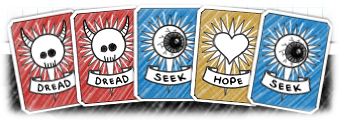Shut Up and Take My Money
Earlier this year, Tim Schafer (of Day of the Tentacle and Grim Fandango fame among others), launched a funding drive on Kickstarter. His studio, Double Fine Productions, was hoping to raise $400,000 from their loyal fans to create a new game and create an access-all-areas documentary of the game production process. After their 45 day campaign had ended, they had raised more than $3,300,000 — eight times the target amount.
Looking at the facts, it made for very impressive reading: until very recently, it was the most funded project ever on Kickstarter, more than 87,000 people had reached into their wallet and pledged millions of dollars in real cash, and the project had received coverage from BBC World News to the Sydney Morning Herald.
There was something less obvious — and potentially more important — about this success however. What had all these people actually purchased? In the vast majority of cases, they had pre-ordered the game, but virtually no details of the game actually existed — no concept art, no story outlines, not even a title. The only detail that was disclosed was that the game was going to be classic point-and-click adventure. That's it.
A parallel universe exists where Tim Schafer and Double Fine are trying to get this game funded through conventional means. They're drawing up the concept art right now, fleshing out the story line, coding up the game demo and putting together the kick ass presentation to show to potential publishers.
The publishers don't like it. The game's theme is too dark. Who's going to buy a game about a suicidal monkey? They don't like the title. The concept art? The less said the better. Sorry Tim, better luck next time.
Power and Freedom
This is the power of Kickstarter. It's complete freedom — freedom to make the decisions that are right for the game, to set the right price, to publish through the channels that make the most sense and to push the release date past Christmas because you need that extra time. It's also about ownership and independence. Your backers on Kickstarter are merely consumers with an extremely early pre-order of your game. They haven't taken gross points or stock options. Any profit you generate is yours to keep.
Kickstarter is not the right platform for everyone however. Did you know that you have to be an American citizen to start a project on Kickstarter? Did you know that there are similar platforms to Kickstarter that actually let you keep the money even if you don't reach your funding target?
Funding Platforms
I've collated some of the best avenues to explore if you're looking to get your game funded.
It seems like the obvious choice to start with Kickstarter. Kickstarter is a consumer democracy. Businesses and individuals pitch their ideas and those ideas live and die by the consumers' vote.
John Gruber described Kickstarter like so:
Kickstarter is one of the most amazing, inspiring, empowering things I’ve ever seen.
However, I think Kevin Dent summed it up best when he said:
I love Kickstarter, I want to marry Kickstarter and I want to curl it up and eat it. The problem is that the pitches range from fantastic to dog shit.
To launch a project with Kickstarter, you must have an Amazon Payments merchant account. To open one of these, you must be an American citizen with a bank account based in the United States.
Once you have set up your Amazon account and your Kickstarter account, you can begin to put your idea pitch together. All you really need is an idea at just about any level of realisation (from concept to physical product), an amount you want to raise and a series of awards for users who will be backing your project.
Kickstarter's funding is all or nothing, so if you set a goal of $100,000 and you raise $99,000, you get nothing. The target must be met or exceeded. If you are lucky enough to meet your target, make sure you have budgeted for the fees that you'll incur. Kickstarter takes 5% of the final amount and Amazon take 2.9% + 30¢ per pledge. Double Fine's bill would have been $289,715.91 for example.
Kickstarter isn't all love, fun, happiness and rainbows however. There are examples of games looking for far less funding that would be required to actually build a successful game, and there has been at least one example of a more insidious side where developers have ripped off other games and posed them as their own creations.
Exercise caution as a backer, and do everything you can to prove you've thought about your project and the process involved in seeing it to reality as a project owner.
IndieGoGo is a similar platform to Kickstarter — you post a project and people back it for specific rewards. There are two critical differences however:
- You are allowed to create projects that receive all money pledged regardless of whether the target funding has been met or not.
- You don't have to be a U.S. citizen to create a campaign.
Financially speaking, IndieGoGo take 4% of the final amount if you reach your goal, and 9% if you don't meet your goal. There are also third party payment processor fees and currency conversion fees, but these varies depending on who you choose (PayPal or similar).
IndieGoGo certainly doesn't have the audience of Kickstarter but they do still receive millions in pledges across all projects each month. You also receive the money immediately, whereas there is a delay in receiving funds from Kickstarter.
Gambitious (no relation) is a European based platform, aimed specifically at generating funding for games. The site has been live for only a couple of days at this point, but they already list a few projects on their site.
They don't work on a pledge / reward basis like Kickstarter and IndieGoGo — users will be able to actually invest in, and take a share of your game. The Gambitious founder, Korstiaan Zandvliet, described it like so:
"A developer decides what percentage of the required funding people can buy. Someone who invests money in a project, becomes a shareholder and is entitled to dividends."
You have to be a citizen of the European Union to invest and they offer two paths for people looking to invest in a game:
- Donate. It's not clear if you receive rewards for your donations, though they are sometimes referenced as "prebuys" in the copy on the Gambitious site, so you may receive a copy of the game.
- Invest. This is where it gets interesting — the developer offers up a percentage of their game and you can purchase a chunk of the game. This means that you will actually own a share in that game and receive dividends from time to time if it ends up being successful.
As a developer, it costs €250 to register a project to be considered for funding, and when funding is complete (and assuming you're successful), 5% is taken by Gambitious. They take the money immediately from investors, meaning that you should get paid very quickly after a successful fundraiser.
As an investor, the process seems a little unwieldy. Each share in a game is actually one unit of "electronic money" which must be purchased before investing in a game. One unit of electric money is worth €20, so, if you wanted to buy 100 shares in a game, that would cost you €2,000. A general administration cost of 2.5% is added to your investment. A VAT administration cost of 19% is applied to the administration cost (seriously), followed by a payment provider fee and VAT on the payment provider fee (totaling a flat rate of €1.19). This is also coupled with multiple agreements to terms and conditions along the way. Overall, a €2,000 investment would cost you €2,060.69 with fees.
If the project is successful, all investors become part of a newly formed legal entity, titled the Investor Cooperative. At this point Gambitious recommends that you consult taxation lawyers or the like to make sure all your tax affairs are in order should you receive dividends from the game.
Overall, it's unclear how this model will work in practice, but it should be an interesting one to keep an eye on. The process feels a little complex, and my fears are not allayed from reading the supporting documentation on the website. I also feel like they'll need to open the platform to US investment to really be successful, but let's wait and see.
AppStori is a launchpad specific for mobile applications. You must be developing an Android or iOS game to qualify for funding here.
They are virtually identical to Kickstarter — all-or-nothing funding, you must be a U.S. citizen to post a project (but not to back one) and users get rewards for pledges.
They are different on three fronts:
- Project submissions are manully reviewed before being published. They will check to make sure that your project meets their mobile guidelines, and that it's not an obvious scam.
- Your game must be a mobile application. Games for any other platform will be rejected. You could post a project to create a mobile version of a game that exists on another platform however.
- They take a bigger slice of the pie: 7% of the final amount, plus the Amazon fees (2.9% + 30¢ per pledge).
You can't apply directly to the Indie Fund for cash, but I've included the Indie Fund here as they are a potential suitor to your game. They mention three ways to improve your chances of getting noticed on the website and they'll contact you if they're impressed by what you're doing. The fact that they take nothing more than a portion of your revenue also means that they are also a great deal for the developer.
The specific details of what kind of funding available from the Indie Fund is shrouded in secrecy, but the mechanics are freely available. The Indie Fund provide you with a sum of money. When you launch your game, all revenue goes towards paying that money back, until they've recouped 100% of the loan.
At this point, the Indie Fund will continue to take 25% of your revenue until they've either doubled their investment, or 2 years elapse from the launch date of your game.
After that, you're debt free.
 Thanks for reading! Now check out Guild of Dungeoneering,
a game I'm making where you build the dungeon instead of controlling the hero! \o/
Thanks for reading! Now check out Guild of Dungeoneering,
a game I'm making where you build the dungeon instead of controlling the hero! \o/







2 Comments
Never heard of the other websites. Great resources for developers wanting funding though.
Nice piece of research. I wasn't aware that Kickstarter was limited to US citizens, what a shame!